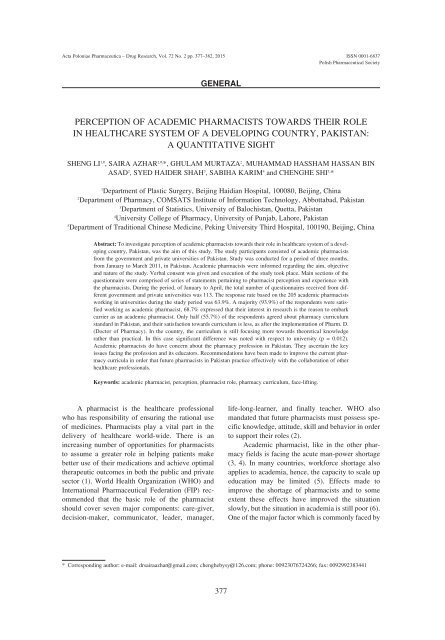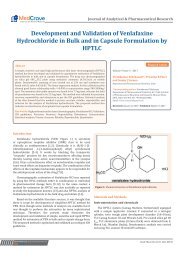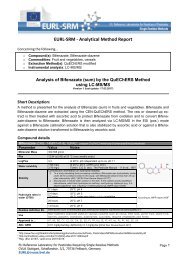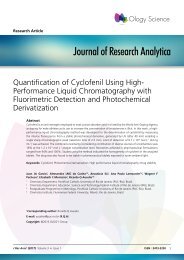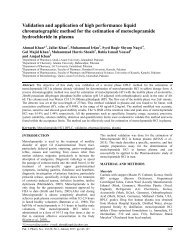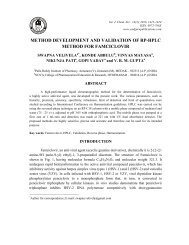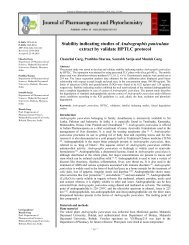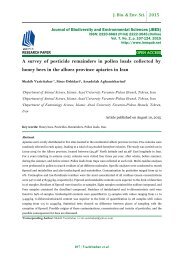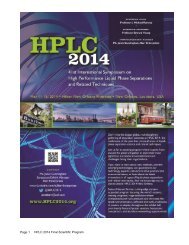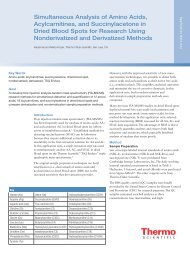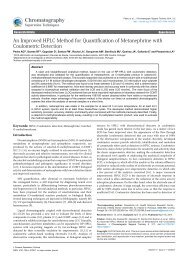acta 2_2015
acta 2_2015
acta 2_2015
- No tags were found...
Create successful ePaper yourself
Turn your PDF publications into a flip-book with our unique Google optimized e-Paper software.
Acta Poloniae Pharmaceutica ñ Drug Research, Vol. 72 No. 2 pp. 377ñ382, <strong>2015</strong> ISSN 0001-6837Polish Pharmaceutical SocietyGENERALPERCEPTION OF ACADEMIC PHARMACISTS TOWARDS THEIR ROLEIN HEALTHCARE SYSTEM OF A DEVELOPING COUNTRY, PAKISTAN:A QUANTITATIVE SIGHTSHENG LI 1,# , SAIRA AZHAR 2,#, *, GHULAM MURTAZA 2 , MUHAMMAD HASSHAM HASSAN BINASAD 2 , SYED HAIDER SHAH 3 , SABIHA KARIM 4 and CHENGHE SHI 5, *1Department of Plastic Surgery, Beijing Haidian Hospital, 100080, Beijing, China2Department of Pharmacy, COMSATS Institute of Information Technology, Abbottabad, Pakistan3Department of Statistics, University of Balochistan, Quetta, Pakistan4University College of Pharmacy, University of Punjab, Lahore, Pakistan5Department of Traditional Chinese Medicine, Peking University Third Hospital, 100190, Beijing, ChinaAbstract: To investigate perception of academic pharmacists towards their role in healthcare system of a developingcountry, Pakistan, was the aim of this study. The study participants consisted of academic pharmacistsfrom the government and private universities of Pakistan. Study was conducted for a period of three months,from January to March 2011, in Pakistan. Academic pharmacists were informed regarding the aim, objectiveand nature of the study. Verbal consent was given and execution of the study took place. Main sections of thequestionnaire were comprised of series of statements pertaining to pharmacist perception and experience withthe pharmacists. During the period, of January to April, the total number of questionnaires received from differentgovernment and private universities was 113. The response rate based on the 205 academic pharmacistsworking in universities during the study period was 63.9%. A majority (93.9%) of the respondents were satisfiedworking as academic pharmacist, 68.7% expressed that their interest in research is the reason to embarkcarrier as an academic pharmacist. Only half (55.7%) of the respondents agreed about pharmacy curriculumstandard in Pakistan, and their satisfaction towards curriculum is less, as after the implementation of Pharm. D.(Doctor of Pharmacy). In the country, the curriculum is still focusing more towards theoretical knowledgerather than practical. In this case significant difference was noted with respect to university (p = 0.012).Academic pharmacists do have concern about the pharmacy profession in Pakistan. They ascertain the keyissues facing the profession and its educators. Recommendations have been made to improve the current pharmacycurricula in order that future pharmacists in Pakistan practice effectively with the collaboration of otherhealthcare professionals.Keywords: academic pharmacist, perception, pharmacist role, pharmacy curriculum, face-lifting.A pharmacist is the healthcare professionalwho has responsibility of ensuring the rational useof medicines. Pharmacists play a vital part in thedelivery of healthcare world-wide. There is anincreasing number of opportunities for pharmaciststo assume a greater role in helping patients makebetter use of their medications and achieve optimaltherapeutic outcomes in both the public and privatesector (1). World Health Organization (WHO) andInternational Pharmaceutical Federation (FIP) recommendedthat the basic role of the pharmacistshould cover seven major components: care-giver,decision-maker, communicator, leader, manager,life-long-learner, and finally teacher. WHO alsomandated that future pharmacists must possess specificknowledge, attitude, skill and behavior in orderto support their roles (2).Academic pharmacist, like in the other pharmacyfields is facing the acute man-power shortage(3, 4). In many countries, workforce shortage alsoapplies to academia, hence, the capacity to scale upeducation may be limited (5). Effects made toimprove the shortage of pharmacists and to someextent these effects have improved the situationslowly, but the situation in academia is still poor (6).One of the major factor which is commonly faced by* Corresponding author: e-mail: drsairaazhar@gmail.com; chenghebysy@126.com; phone: 00923076724266; fax: 0092992383441377


